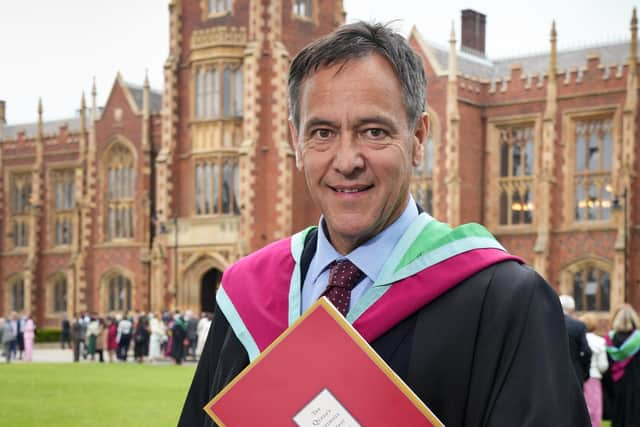Cormac has mastered postgraduate study at CAFRE
and live on Freeview channel 276
Contrary to his earlier thoughts, Cormac recently graduated with a Master’s in Business for Agri-Food and Rural Enterprise, which he attained by studying part-time at CAFRE, Loughry Campus.
As the years went by, it was clear to Cormac that you never stop learning.
Advertisement
Advertisement
“Learning from experience, from mistakes, from others and from in-job training, your development goes on. Learning makes us better able to cope with issues as they arise and opens opportunities,” Cormac remarked.


Thirty years later, as he was helping his son with his A-Level Business studies, Cormac felt ready to embrace education again.
“My career has been spent in agriculture as a college lecturer, farm manager, farm adviser and now with the Ulster Bank. I knew whatever course I would choose had to involve agriculture, and ideally agri-business.
“I did not have to look too far. The CAFRE/QUB Master’s in Business for Agri-Food and Rural Enterprise was ideal for me,” said Cormac.
Advertisement
Advertisement
“The course can be completed full-time or part-time, so it did not impact on my work. It was broken down into manageable modules that could be completed within sensible timelines.
“The course is a three-year taught programme which was important to me. After being out of the classroom for so long, I could not be left to get on with the modules myself. There would be too many distractions and missed deadlines if I was left on my own!
“The weekly Thursday evening classes gave great structure and to have lectures face-to-face ensured good attendance. It also was great socially. I was able to mix and learn from classmates, some who were recent graduates and others who have been working in industry for years.
“The lecturers have agri-food backgrounds, providing a great source of knowledge and understanding of the sector. They were engaging, supportive, gave good and prompt feedback on modules.
Advertisement
Advertisement
“There was a good mix of guest speakers and student participation too. The modules covered topics from leadership and business management through to communication and entrepreneurship. They helped me ‘think outside the box’ and bring fresh thinking to my work routine,” Cormac commented.
“The programme is delivered at Loughry Campus, near Cookstown. To have a course of this quality in mid-ulster rather than having to travel to Belfast was brilliant. Covid restrictions hit during my second year meaning lectures moved online. I preferred being in the classroom but managed the weekly Zoom calls.
“The course showed that we need to be adaptable to changing circumstances and helped build resilience. The final year is spent compiling a research project, on a subject of your choice. I chose to research how Northern Ireland milk buyers and others in the supply chain could help dairy farmers transition to lower carbon emissions.
“I enjoyed the project and the support given by my supervisor was invaluable,” he continued.
Advertisement
Advertisement
“My class graduated in July, and I am delighted in what I achieved. I am using the learnings from the course every day. I would recommend the course to anyone in the agri-food sector keen to challenge themselves and to push on and keep learning. You don’t have to wait 30 years but, even if you have, don’t be afraid to go again,” Cormac added.
Applications are still being accepted for full-time and part-time places starting this September. For more information and details of how to apply to the MSc in Business for Agri-Food and Rural Enterprise, visit the CAFRE website www.cafre.ac.ukYou will find the course information listed under Postgraduate courses. You can also follow CAFRE on Facebook and Instagram at ‘Discover CAFRE or access the QUB website: www.qub.ac.uk